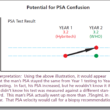Reliability of serial prostate magnetic resonance imaging (MRI) scans to detect prostate cancer progression during active surveillance
Researchers assessed the diagnostic estimates of serial prostate MRI scans for detecting
prostate cancer progression during active surveillance for low-risk prostate cancer.
Systematically searching the scientific publication databases, they selected 15 studies for
review, a total of 2240 patients.

© Sanford Radom, MD
The pooled rate of prostate cancer progression in men on active surveillance, which included
progression to Gleason grade ≥2, was 27%. The pooled sensitivity for the MRI scan detecting
progression was 59% and the specificity of the scan for correctly calling non-progression was
75%. Depending on prevalence of progression in the population, the pooled negative predictive
value for progression with serial prostate MRI was 81-88%, and the pooled positive predictive
value for progression was 37-50%.
Thus, serial prostate MRI alone in patients on active surveillance is not accurate enough to reliably rule out or rule in prostate cancer progression. Other clinical factors and biomarkers
along with serial MRI are required to safely tailor the intensity of surveillance follow-up
biopsies.
URajwa, P et al. European Urology (2021):





















